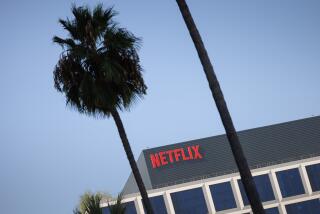Comcast tries tiered data pricing, continues fight with Netflix
Comcast is removing a cap on Internet usage and may charge heavy broadband users more under a new policy that’s likely to ease but not end its feud with Netflix.
The nation’s largest cable company said Thursday that it will end a 250-gigabytes-per-month cap on the amount of data Internet subscribers can access. While “very few” users come close to that cap -- an executive declined to specify the percentage, but said half use fewer than 10 GB — it is starting to become a concern for the small percentage who stream or download huge amounts of video.
Instead, Comcast will begin testing so-called “tiered pricing,” through which people who use more than 300 GB per month will pay additional fees. Executive Vice President David L. Cohen said the amount would likely be $10 for every 50 GB.
In some test markets, Cohen said, people who pay more for higher-speed access will have a higher maximum than 300 GB before they must pay more.
Comcast customers who don’t live in test markets will temporarily have unlimited Internet usage.
Over the past few years, cable companies such as Comcast have found that high-speed Internet service has become a more important driver of revenue and profits than traditional television channel bundles.
“Tiered pricing” for broadband is becoming increasingly common, with most cellular service provided and some Internet providers seeking to charge more to their heaviest users.
As more people access services that take up huge amounts of data, particularly video, that’s becoming a growing concern.
“Our network is not an infinite resource and it is expensive to expand it,” Cohen said on a conference call. “We think we’re ready to transition from what might have been a state-of-the-art approach four years ago to different approaches today, ones we think are more pro-consumer and pro-innovation.”
Netflix Chief Executive Reed Hastings has criticized Comcast for treating its own Xfinity TV service on the Xbox 360, which lets subscribers stream television shows and movies, differently than other services on the video game console. Video from Netflix and other providers such as Hulu counts against the data limits, but Xfinity video does not.
“The only difference between the Xfinity Xbox data and Netflix Xbox data is the Xfinity data is favored by Comcast exempting it from the cap,” Hastings and Chief Financial Officer David Wells wrote in a recent letter to shareholders.
Cohen said the policy change was not a response to Netflix’s criticisms but admitted there has been “an increasing sensitivity on the amount of bandwidth being used” with the launch of new video applications. Very few Netflix customers are likely to use 300 GB per month, he said, and even they will be able to pay more for increased access.
However, he said in response to questions about Netflix’s views, “It’s a stretch to create a discrimination argument here,” noting that many video services that Comcast owns, such as NBC.com, do count against the data limits.
Comcast transmits data for the Xfinity app on the Xbox through a private network because it believes Xfnitity on the Xbox is more akin to television than Internet video.
A Netflix spokesman called Comcast’s policy change “a small step in the right direction,” but maintained that it does not solve the philosophical dispute.
“Unfortunately, Comcast continues to treat its own Internet-delivered video different under the cap than other Internet delivered video,” he wrote in an email. “We continue to stand by the principle that [Internet service providers] should treat all providers of video services equally.”
RELATED:
Netflix faces problems in Latin America
Netflix posts first loss since 2005, shares plunge
Netflix chief got 68% raise in 2011, pay cut for 2012
More to Read
From the Oscars to the Emmys.
Get the Envelope newsletter for exclusive awards season coverage, behind-the-scenes stories from the Envelope podcast and columnist Glenn Whipp’s must-read analysis.
You may occasionally receive promotional content from the Los Angeles Times.










